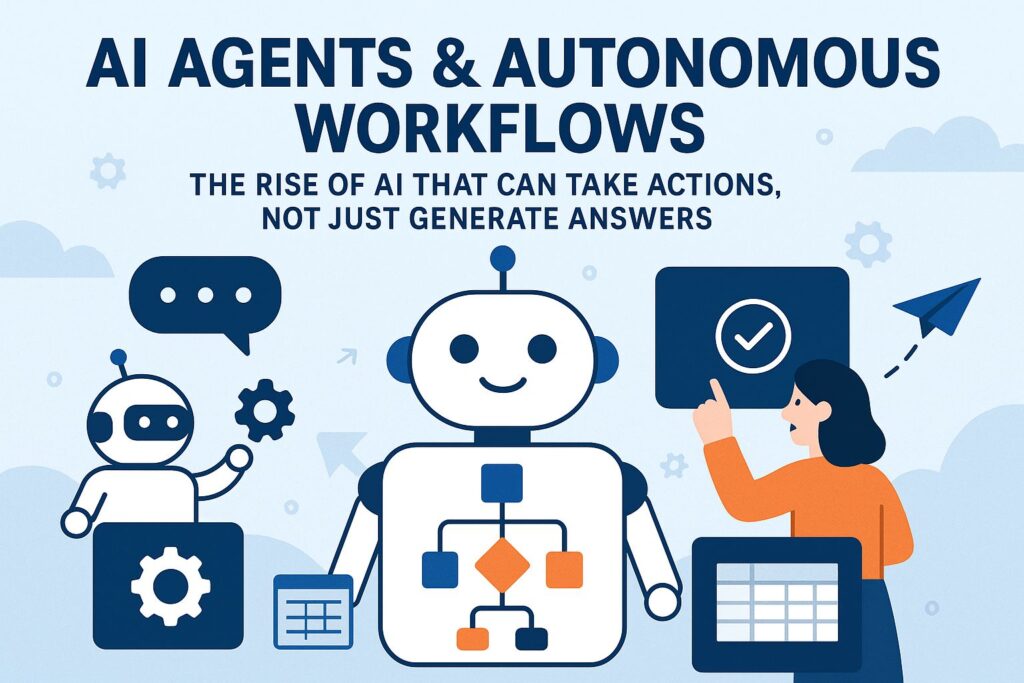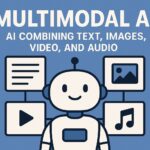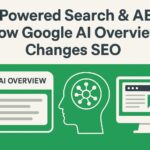Introduction
AI is evolving — and fast.
Until recently, most AI systems could only generate answers: they’d help you write text, summarize documents, or suggest ideas.
But 2025 marks a new phase: the era of AI Agents — intelligent systems that can take autonomous actions, not just respond.
From managing business workflows to booking appointments and even debugging code, AI agents are now becoming digital teammates — working alongside humans to get things done.
What Are AI Agents?
An AI Agent is an advanced AI system capable of understanding goals, making decisions, and taking actions — all with minimal human input.
Unlike traditional AI models that wait for user prompts, AI agents can:
- Plan multi-step tasks
- Execute commands across tools and APIs
- Learn from previous actions
- Adapt to changing objectives
Think of them as digital employees that can read instructions, act, and deliver results — autonomously.
How AI Agents Work
AI agents combine several advanced technologies under the hood:
- LLMs (Large Language Models) – Provide reasoning, communication, and understanding capabilities.
- Tool Use / API Integration – Allow agents to perform real actions like sending emails, fetching data, or updating CRM entries.
- Memory Systems – Store context and learn from past interactions.
- Autonomous Looping – Let agents run multiple iterations until a goal is achieved.
This combination makes AI agents action-oriented rather than purely conversational.
From Chatbots to Autonomous Agents
Traditional chatbots were rule-based and reactive.
Then came generative AI, capable of producing creative outputs.
Now, autonomous AI agents represent the next evolution — systems that can:
- Set goals,
- Execute workflows,
- Access external tools, and
- Optimize results on their own.
Platforms like OpenAI’s GPTs, Anthropic’s Claude Projects, LangChain, CrewAI, and AutoGPT are paving the way for enterprise-grade agentic systems.
Examples of AI Agents in Action (2025)
1. Business Automation
AI agents can analyze reports, update dashboards, send follow-ups, and manage project timelines — all autonomously.
2. Customer Support
Agents can understand intent, fetch account data, and resolve issues without human help.
3. Software Development
AI coding agents can write, test, and debug code, speeding up software delivery cycles.
4. Finance & Operations
They can reconcile data, generate invoices, monitor transactions, and detect anomalies in real time.
5. Marketing & Sales
AI agents can write personalized emails, schedule posts, and update CRM records — automating the entire outreach process.
What Are Autonomous Workflows?
Autonomous workflows are sequences of tasks that AI agents execute end-to-end without manual supervision.
For instance:
A sales agent could identify leads → send an email → follow up → schedule a call → record the data in a CRM — automatically.
By linking multiple AI agents, organizations can create self-running systems that continuously adapt and optimize business processes.
Benefits of AI Agents & Autonomous Workflows
- Efficiency: Automate repetitive tasks and reduce human intervention.
- 24/7 Operations: AI agents don’t rest, ensuring round-the-clock productivity.
- Cost Savings: Lower operational costs by automating manual tasks.
- Scalability: Handle growing workloads without hiring additional staff.
- Consistency: Eliminate human errors in routine workflows.
Challenges and Risks
Like any emerging technology, AI agents and autonomous workflows come with challenges:
- Over-reliance on automation can reduce human oversight.
- Security & access control must be tightly managed to prevent misuse.
- Contextual understanding still has limitations in complex decision-making.
The key is to balance autonomy with accountability — designing systems that are intelligent yet auditable.
The Future of AI Agents (2025 & Beyond)
In 2025, AI agents are transitioning from experimental tools to core enterprise infrastructure.
By 2026, businesses are expected to run hybrid teams — humans collaborating with fleets of AI agents across every department.
Imagine an organization where:
- An HR agent handles onboarding,
- A finance agent manages expense tracking, and
- A marketing agent executes campaigns — all in sync.
That’s not sci-fi anymore. That’s autonomous workflow orchestration, powered by AI agents.
Conclusion
We’re entering a new age of AI — one where systems don’t just respond but act.
AI Agents and Autonomous Workflows represent the shift from passive intelligence to proactive execution.
Whether you’re a business leader, developer, or student, understanding how these systems work will be critical in 2025 and beyond.
The future of work isn’t human vs. machine — it’s humans empowered by autonomous AI.



